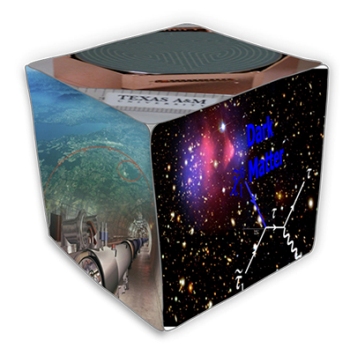Mar 6 2013
Scientists from around the world will join Texas A&M University's top experts in high-energy physics and astrophysics for a three-day workshop beginning Friday (March 8) that will delve into dark matter, the unknown substance that makes up nearly a quarter of the universe.
 Texas A&M physicists are key players in international experiments investigating all sides of the dark matter mystery, from direct and indirect detection to collider methods.
Texas A&M physicists are key players in international experiments investigating all sides of the dark matter mystery, from direct and indirect detection to collider methods.
Roughly three dozen dark-matter researchers from the U.S. and around the world -- including England, Germany and Japan -- will fly into College Station for the March 8-10 Dark Matter Workshop, hosted and funded by the George P. and Cynthia Woods Mitchell Institute for Fundamental Physics and Astronomy.
Unlocking the mystery of dark matter means unlocking the mystery of the universe -- an 80-year-old odyssey currently surrounded by buzz, as Nobel laureate Samuel Ting has said he will make an important announcement soon about his research into dark matter.
It's an epic space race that Texas A&M is uniquely positioned to be a key player in, says high-energy theorist Bhaskar Dutta, thanks to Department of Physics and Astronomy researchers who are involved in every known method and international experiment (see list below) currently encompassing the high-stakes global hunt.
"We only understand 4 percent of the universe right now," said Dutta, interim director of Mitchell Institute. "Once we know this 23 percent that is dark matter, we're hoping it may give us a lead into understanding the remaining 73 percent, which is dark energy. Once we understand it all, then we'll know the past, present and future of the universe."
Such a discovery could be impactful beyond a basic understanding of the universe, Dutta notes.
"When quantum mechanics was discovered, no one knew that one day, you'd use the microwave at home to heat up your food," Dutta said. "No one can predict during those moments of discovery where this will eventually lead. Once we start knowing this stuff, there will be spinoffs."
Dark matter -- named such because it is an unknown that does not interact with light -- can't be seen directly by telescopes and doesn't emit or absorb light at any significant level. It‘s not like any "normal" matter such as stars, planets or any living or nonliving material on Earth. It's not even a black hole.
The search for understanding dark matter, Dutta said, focuses on two questions: What is it, and how was it created?
Scientists around the world are trying to answer these questions using three methods: direct detection, indirect detection and a collider method. In direct detection, researchers wait for dark matter particles to hit a detector. Through indirect detection, experiments search for the products of the annihilation of dark matter particles. In the collider method, dark matter particles are produced when protons are collided and observed as missing energy.
"Most other places are strong in a particular method," Dutta said. "Texas A&M is strong in all of them. There's a beautiful collaboration going on here among the theorists and the experimentalists."
Dutta said he hopes the gathering becomes an annual event to study dark matter and trade theories within a small, focused group.
For more information about the workshop, visit http://darkmatter.tamu.edu/.
To learn more about the Mitchell Institute, go to http://mitchell.physics.tamu.edu/.
For more information about the Texas A&M Department of Physics and Astronomy, visit http://physics.tamu.edu/.